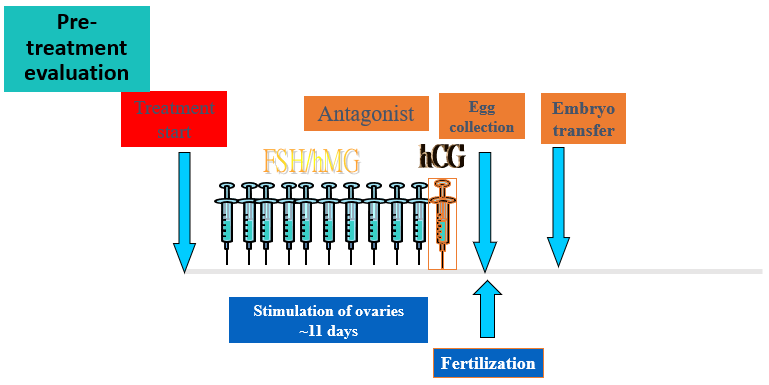How do I count day 1 of my period?
Day 1 is taken as the day when you experience normal flow of period. Do not consider spotting as day 1 since spotting can last for a few days.
When will my egg collection or embryo transfer be done? I need to take a day-off in advance for my work.
Injection for ovarian stimulation usually takes 10-12 days, if the response to stimulation drugs is satisfactory. But in some cases when the response to stimulation drugs is not satisfactory, injections may last from 2 to 3 weeks. Therefore the day of egg collection cannot be predicted before treatment starts. You can schedule the IVF treatment in a month when you will be less busy. We will issue sick leave for three days from the day of egg collection. Please consult our doctor for the availability of your desired treatment month.
When is my husband required to come during the treatment?
The husband is only required to submit semen on the day of the wife’s egg collection. In case he may not be available (as the day of egg collection cannot be predicted), you can request sperm freezing before treatment starts. If your husband has difficulty in submitting a semen sample on request, he is also advised to freeze a semen sample before the egg collection. Please inform our nurse if you wish to do so.
Will I be unconscious during the egg collection?
Our egg collection is not performed under general anaethesia. Therefore, you will be awake during the procedure. We will give you intravenous injection of pain killer and sedative and local injection of pain killer next to the neck of the womb before the procedure. This will much reduce your pain levels during egg collection. We can repeat another dose of intravenous pain killer if you still feel painful during the collection.
Do I need to stay overnight after the egg collection?
After egg collection, you need to rest in the ward for at least 4 hours. You can be discharged on the same day if there is no discomfort after 4 hours and someone is available to pick you up.
Do I need to stay overnight after embryo transfer?
Embryo transfer is a non-invasive procedure where no needle puncture or drug is required. Therefore you can be discharged immediately after the transfer. You are advised to continue your usual daily activities and bed rest is not recommended.
Do I need to choose the method of fertilization?
We will decide which method of fertilization is suitable for you depending on the semen parameters of your husband. Intracytoplasmic sperm injection (injection of a single sperm into an egg) is indicated only in those with very poor semen parameters.
What is extended culture?
Extended culture is a natural selection process. Only embryos with good quality can survive and develop into blastocysts. About half of the embryos will become blastocysts after extended culture. The purpose is to reduce the number of embryo transfers required, thus shortening your journey to pregnancy. Couples with more than 3 embryos two days after egg collection will usually proceed to extended culture.
Can I replace 2 embryos at a time?
This is not recommended as it will increase the risk of multiple pregnancies. We suggest all women to replace 1 embryo at a time. Only women who are above 38 years at the time of IVF or not pregnant after 2 cycles of IVF and have no livebirth before may have two embryos replaced. If extended culture is done, you can only replace 1 blastocyst at a time.
Is there any risk of lysis on thawing the frozen embryos or blastocysts?
There is less than 10% chance that the embryo or blastocyst may not survive the thawing procedure (thawing will occur on the day of transfer). Therefore it is possible that no transfer could be done on the day if the last embryo or blastocyst does not survive the thawing process.
Why does ectopic pregnancy still occur after an embryo is transferred to the womb?
The embryo can be flushed to the Fallopian tube after being transferred to the womb. There is still 5% chance that ectopic pregnancy can occur in IVF.




 繁體中文
繁體中文